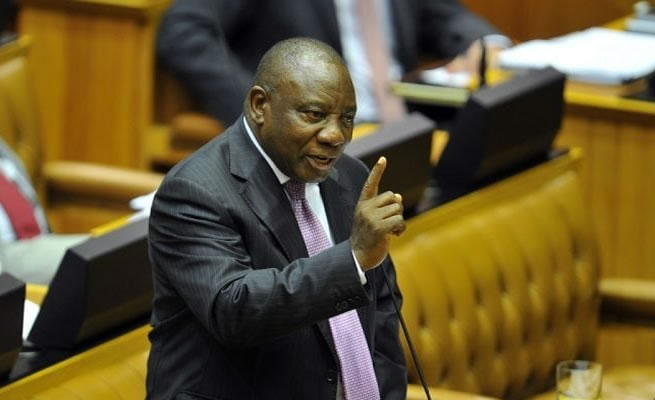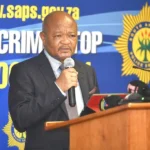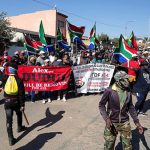In the wake of the African National Congress (ANC) experiencing a staggering loss in the recent elections, President Cyril Ramaphosa has defied expectations by refusing to step down as the party's leader. Despite the ANC's historic decline, which saw its electoral majority slip away after 30 years, Ramaphosa remains steadfast in his commitment to steer South Africa towards a future marked by political maturity and stable governance.
Sources close to the president have revealed that Ramaphosa views the current political landscape as an opportunity for a strategic alliance with the Democratic Alliance, a move he considers "pragmatic" given the circumstances. While the ANC's younger members and Gauteng leadership initially leaned towards forming a coalition with the Economic Freedom Fighters (EFF), the party's diminished share of the vote in comparison to the 2019 elections has shifted their perspective.
Confidential conversations with high-ranking ANC insiders disclosed that an in-principle agreement for collaboration between the ANC and DA already exists, with both parties aligning their objectives. However, the specifics of this unprecedented pact are yet to be finalized, leaving political pundits and South Africans alike eager to learn how this alliance will unfold.
The proposed coalition presents a critical dilemma for the Democratic Alliance, which has anticipated this moment for some time. The party now finds itself at a crossroads, weighing two possible paths. The first option entails a full-blown coalition, with the DA assuming the role of the ANC's junior partner. Alternatively, a narrower agreement could be forged, focusing on specific steps necessary for effective governance, such as electing the president in the National Assembly and passing the national budget.
In return for its cooperation, the DA would secure key positions within parliament, enabling effective oversight of the executive branch. Notably, the party is expected to advocate for greater devolution of powers to provinces during negotiations. However, this potential partnership raises questions about ideological compatibility, considering the historical divergences between the ANC and DA on issues like black economic empowerment.
"Going into bed with the DA will ensure the ANC sleeps forever and does not rise," one PEC official warned, suggesting that such a move would alienate the party's base in the black working-class communities.
While Ramaphosa's decisive stance in favor of coalition-building with the DA has gained support within the ANC, opposition to this path has emerged in the Eastern Cape province. ANC members in this region express concerns that aligning with the DA would alienate the party's traditional base, particularly the black working class in townships and rural areas. They argue that such a move would provide an advantage to the EFF and the newly prominent uMkhonto weSizwe Party, the third-largest party in the country following the recent elections.
Regardless of internal dissent, Ramaphosa's conviction remains unshaken. The ANC's success in the Eastern Cape province, where he secured his position as ANC president in 2017 and won re-election five years later, has strengthened his resolve to pursue a coalition with the DA. While some ANC members in the Eastern Cape voiced opposition to this strategy, characterizing it as detrimental to the party's future, Ramaphosa's supporters argue that it represents a pragmatic approach to secure stable governance.
As the ANC's top leadership convenes to clarify its stance, the DA faces its own internal deliberations. The party's federal executive, scheduled to meet for an all-day session, must decide on the best way forward. While there are calls for a conventional coalition with the ANC, particularly from within the DA's constituencies, the party appears to be leaning towards the narrower option that demands concessions from the ANC on specific legislation, including the recently signed National Health Insurance Act.
Sunday's meeting will shed light on the DA's strategy, which will be crucial in determining the direction of formal talks between the ANC and DA. Both parties must seek concurrence from their respective executive committees before embarking on this groundbreaking political collaboration.
Nevertheless, amidst the ANC's internal debates and the DA's decision-making, the eyes of the nation remain fixed on the outcome. The proposed coalition between these political heavyweights carries the potential to redefine South Africa's political landscape, challenging conventional notions of party loyalty and forging a new path towards governance that transcends historical barriers.
Commenting on the matter, EFF President Julius Malema emphasized that his party would not impose any conditions for participating in a coalition with the ANC. The EFF, open to working with either the ANC or uMkhonto weSizwe Party on provincial or national levels, has chosen not to intervene in the ANC's internal leadership disputes.
As the nation awaits further developments, Ramaphosa's resilience and commitment to finding stable governance solutions in the face of adversity have captivated the public's attention. South Africans remain hopeful that this unprecedented coalition will pave the way for a transformed political landscape, providing a fresh perspective and renewed hope for the future.

Follow Us on Twitter










